29 sept 2012
Israeli surveillance drone skims over Lebanon's skies
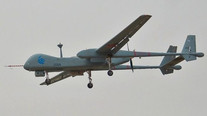
An Israeli reconnaissance drone has crossed into Lebanese airspace and flown over parts of the country in blatant violation of a UN Security Council resolution.
The unmanned aerial vehicle violated Lebanese airspace over the southern village of al-Naqoura, which is situated 91 kilometers (57 miles) south of Beirut, at 7:30 a.m. local time (0430 GMT) on Friday, according to a statement issued by the Lebanese military on Saturday.
The remote-controlled aircraft made surveillance flights over the Lebanese capital and surrounding areas before it left Lebanese airspace at 6:55 p.m. local time (1555 GMT) while flying over the southern sector of the country.
Israel violates Lebanon's airspace on an almost daily basis, claiming the flights serve surveillance purposes.
Lebanon's government, the Hezbollah resistance movement, and the UN Interim Force in Lebanon, known as UNIFIL, have repeatedly condemned the overflights, saying they are in clear violation of UN Resolution 1701 and the country's sovereignty.
UN Security Council Resolution 1701, which brokered a ceasefire in the war of aggression Israel launched against Lebanon in 2006, calls on Israel to respect Lebanon's sovereignty and territorial integrity.
In 2009, Lebanon filed a complaint with the United Nations, presenting over 7,000 documents pertaining to Israeli violations of Lebanese territory.
The unmanned aerial vehicle violated Lebanese airspace over the southern village of al-Naqoura, which is situated 91 kilometers (57 miles) south of Beirut, at 7:30 a.m. local time (0430 GMT) on Friday, according to a statement issued by the Lebanese military on Saturday.
The remote-controlled aircraft made surveillance flights over the Lebanese capital and surrounding areas before it left Lebanese airspace at 6:55 p.m. local time (1555 GMT) while flying over the southern sector of the country.
Israel violates Lebanon's airspace on an almost daily basis, claiming the flights serve surveillance purposes.
Lebanon's government, the Hezbollah resistance movement, and the UN Interim Force in Lebanon, known as UNIFIL, have repeatedly condemned the overflights, saying they are in clear violation of UN Resolution 1701 and the country's sovereignty.
UN Security Council Resolution 1701, which brokered a ceasefire in the war of aggression Israel launched against Lebanon in 2006, calls on Israel to respect Lebanon's sovereignty and territorial integrity.
In 2009, Lebanon filed a complaint with the United Nations, presenting over 7,000 documents pertaining to Israeli violations of Lebanese territory.
26 sept 2012
Seven Israeli military aircraft skim Lebanon skies
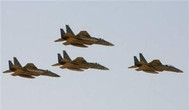
Israeli military aircraft have entered Lebanese airspace and flown over areas of the country in blatant violation of a UN Security Council resolution.
Six Israeli fighter jets crossed into Lebanese airspace over the border village of Kfar Kila, located about 96 kilometers (59 miles) south of the capital Beirut, at 2:05 p.m. local time (1105 GMT) on Thursday, according to a statement issued by the Lebanese military.
The warplanes flew over several areas of the country before they left the Lebanese airspace at 3:55 p.m. local time (1255 GMT) while flying over the southern village of al-Naqoura, which is situated some 91 kilometers (57 miles) south of Beirut.
Earlier in the day, an Israeli unmanned aerial vehicle also breached Lebanon’s airspace over Kfar Kila at 8:15 a.m. local time (0515 GMT) and made surveillance flights over several areas in southern Lebanon.
The remote-controlled aircraft left Lebanese airspace at 11:45 a.m. local time (0845 GMT) while flying over the southern border town of Alma al-Shaab.
Israel violates Lebanon’s airspace on an almost daily basis, claiming the flights serve surveillance purposes.
Lebanon’s government, the Hezbollah resistance movement, and the UN Interim Force in Lebanon, known as UNIFIL, have repeatedly condemned the overflights, saying they are in clear violation of UN Resolution 1701 and the country’s sovereignty.
UN Security Council Resolution 1701, which brokered a ceasefire in the war of aggression Israel launched against Lebanon in 2006, calls on Israel to respect Lebanon’s sovereignty and territorial integrity.
In 2009, Lebanon filed a complaint with the United Nations, presenting over 7,000 documents pertaining to Israeli violations of Lebanese territory.
Six Israeli fighter jets crossed into Lebanese airspace over the border village of Kfar Kila, located about 96 kilometers (59 miles) south of the capital Beirut, at 2:05 p.m. local time (1105 GMT) on Thursday, according to a statement issued by the Lebanese military.
The warplanes flew over several areas of the country before they left the Lebanese airspace at 3:55 p.m. local time (1255 GMT) while flying over the southern village of al-Naqoura, which is situated some 91 kilometers (57 miles) south of Beirut.
Earlier in the day, an Israeli unmanned aerial vehicle also breached Lebanon’s airspace over Kfar Kila at 8:15 a.m. local time (0515 GMT) and made surveillance flights over several areas in southern Lebanon.
The remote-controlled aircraft left Lebanese airspace at 11:45 a.m. local time (0845 GMT) while flying over the southern border town of Alma al-Shaab.
Israel violates Lebanon’s airspace on an almost daily basis, claiming the flights serve surveillance purposes.
Lebanon’s government, the Hezbollah resistance movement, and the UN Interim Force in Lebanon, known as UNIFIL, have repeatedly condemned the overflights, saying they are in clear violation of UN Resolution 1701 and the country’s sovereignty.
UN Security Council Resolution 1701, which brokered a ceasefire in the war of aggression Israel launched against Lebanon in 2006, calls on Israel to respect Lebanon’s sovereignty and territorial integrity.
In 2009, Lebanon filed a complaint with the United Nations, presenting over 7,000 documents pertaining to Israeli violations of Lebanese territory.
25 sept 2012
Israeli drone violates Lebanese airspace
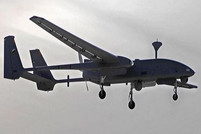
An Israeli reconnaissance plane has penetrated Lebanese airspace and flown over parts of the country in flagrant violation of a UN Security Council resolution.
The unmanned aerial vehicle crossed into Lebanon's airspace over the southern border town of Alma al-Shaab at 9:10 a.m. local time (0610 GMT) on Friday, according to a statement issued by the Lebanese military on Saturday.
The remote-controlled aircraft carried out surveillance flights over several areas in southern Lebanon as well as the Bekaa Valley and the town of al-Arz before it left Lebanese airspace at 7:15 p.m. local time (1612 GMT) while flying over the southern village of al-Naqoura, which is situated 91 kilometers (57 miles) south of the capital Beirut.
Israel violates Lebanon's airspace on an almost daily basis, claiming the flights serve surveillance purposes.
Lebanon's government, the Hezbollah resistance movement, and the UN Interim Force in Lebanon, known as UNIFIL, have repeatedly condemned the overflights, saying they are in clear violation of UN Resolution 1701 and the country's sovereignty.
UN Security Council Resolution 1701, which brokered a ceasefire in the war of aggression Israel launched against Lebanon in 2006, calls on Israel to respect Lebanon's sovereignty and territorial integrity.
In 2009, Lebanon filed a complaint with the United Nations, presenting over 7,000 documents pertaining to Israeli violations of Lebanese territory.
The unmanned aerial vehicle crossed into Lebanon's airspace over the southern border town of Alma al-Shaab at 9:10 a.m. local time (0610 GMT) on Friday, according to a statement issued by the Lebanese military on Saturday.
The remote-controlled aircraft carried out surveillance flights over several areas in southern Lebanon as well as the Bekaa Valley and the town of al-Arz before it left Lebanese airspace at 7:15 p.m. local time (1612 GMT) while flying over the southern village of al-Naqoura, which is situated 91 kilometers (57 miles) south of the capital Beirut.
Israel violates Lebanon's airspace on an almost daily basis, claiming the flights serve surveillance purposes.
Lebanon's government, the Hezbollah resistance movement, and the UN Interim Force in Lebanon, known as UNIFIL, have repeatedly condemned the overflights, saying they are in clear violation of UN Resolution 1701 and the country's sovereignty.
UN Security Council Resolution 1701, which brokered a ceasefire in the war of aggression Israel launched against Lebanon in 2006, calls on Israel to respect Lebanon's sovereignty and territorial integrity.
In 2009, Lebanon filed a complaint with the United Nations, presenting over 7,000 documents pertaining to Israeli violations of Lebanese territory.
22 sept 2012
Israeli military aircraft cross into Lebanese airspace
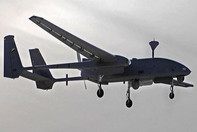
Two Israeli reconnaissance drones have penetrated Lebanese airspace and flown over areas of the country in blatant violation of a UN Security Council resolution.
An unmanned aerial vehicle crossed into Lebanon's airspace over the southern village of al-Naqoura, which is situated 91 kilometers (57 miles) south of Beirut, at 6:30 a.m. local time (0330 GMT) on Saturday, according to a statement issued by the Lebanese military.
The remote-controlled aircraft carried out surveillance flights over several areas in southern Lebanon before it left Lebanese airspace at 6:10 p.m. local time (1510 GMT) while flying over the southern village of Rmeish.
Another Israeli drone violated Lebanese airspace over the southern border town of Alma al-Shaab at 7:05 a.m. local time on Saturday and flew over several areas of southern Lebanon.
The Israeli aircraft left Lebanese airspace at 1:25 p.m. local time (1025 GMT) while flying over Rmeish village.
Israel violates Lebanon's airspace on an almost daily basis, claiming the flights serve surveillance purposes.
Lebanon's government, the Hezbollah resistance movement, and the UN Interim Force in Lebanon, known as UNIFIL, have repeatedly condemned the overflights, saying they are in clear violation of UN Resolution 1701 and the country's sovereignty.
UN Security Council Resolution 1701, which brokered a ceasefire in the war of aggression Israel launched against Lebanon in 2006, calls on Israel to respect Lebanon's sovereignty and territorial integrity.
In 2009, Lebanon filed a complaint with the United Nations, presenting over 7,000 documents pertaining to Israeli violations of Lebanese territory.
An unmanned aerial vehicle crossed into Lebanon's airspace over the southern village of al-Naqoura, which is situated 91 kilometers (57 miles) south of Beirut, at 6:30 a.m. local time (0330 GMT) on Saturday, according to a statement issued by the Lebanese military.
The remote-controlled aircraft carried out surveillance flights over several areas in southern Lebanon before it left Lebanese airspace at 6:10 p.m. local time (1510 GMT) while flying over the southern village of Rmeish.
Another Israeli drone violated Lebanese airspace over the southern border town of Alma al-Shaab at 7:05 a.m. local time on Saturday and flew over several areas of southern Lebanon.
The Israeli aircraft left Lebanese airspace at 1:25 p.m. local time (1025 GMT) while flying over Rmeish village.
Israel violates Lebanon's airspace on an almost daily basis, claiming the flights serve surveillance purposes.
Lebanon's government, the Hezbollah resistance movement, and the UN Interim Force in Lebanon, known as UNIFIL, have repeatedly condemned the overflights, saying they are in clear violation of UN Resolution 1701 and the country's sovereignty.
UN Security Council Resolution 1701, which brokered a ceasefire in the war of aggression Israel launched against Lebanon in 2006, calls on Israel to respect Lebanon's sovereignty and territorial integrity.
In 2009, Lebanon filed a complaint with the United Nations, presenting over 7,000 documents pertaining to Israeli violations of Lebanese territory.
19 sept 2012
Israeli spy drone violates Lebanese airspace
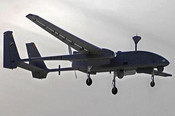
An Israeli reconnaissance plane has penetrated Lebanese airspace and flown over parts of the country in flagrant violation of a UN Security Council resolution.
The unmanned aerial vehicle crossed into Lebanon's airspace over the southern border town of Alma al-Shaab at 8:05 a.m. local time (0505 GMT) on Tuesday, according to a statement issued by the Lebanese military.
The remote-controlled aircraft carried out surveillance flights over several areas in southern Lebanon as well as the Bekaa Valley, which is situated about 30 kilometers (18 miles) east of Beirut, before it left Lebanese airspace at 7:00 p.m. local time (1600 GMT).
Israel violates Lebanon's airspace on an almost daily basis, claiming the flights serve surveillance purposes.
Lebanon's government, the Hezbollah resistance movement, and the UN Interim Force in Lebanon, known as UNIFIL, have repeatedly condemned the overflights, saying they are in clear violation of UN Resolution 1701 and the country's sovereignty.
UN Security Council Resolution 1701, which brokered a ceasefire in the war of aggression Israel launched against Lebanon in 2006, calls on Israel to respect Lebanon's sovereignty and territorial integrity.
In 2009, Lebanon filed a complaint with the United Nations, presenting over 7,000 documents pertaining to Israeli violations of Lebanese territory.
The unmanned aerial vehicle crossed into Lebanon's airspace over the southern border town of Alma al-Shaab at 8:05 a.m. local time (0505 GMT) on Tuesday, according to a statement issued by the Lebanese military.
The remote-controlled aircraft carried out surveillance flights over several areas in southern Lebanon as well as the Bekaa Valley, which is situated about 30 kilometers (18 miles) east of Beirut, before it left Lebanese airspace at 7:00 p.m. local time (1600 GMT).
Israel violates Lebanon's airspace on an almost daily basis, claiming the flights serve surveillance purposes.
Lebanon's government, the Hezbollah resistance movement, and the UN Interim Force in Lebanon, known as UNIFIL, have repeatedly condemned the overflights, saying they are in clear violation of UN Resolution 1701 and the country's sovereignty.
UN Security Council Resolution 1701, which brokered a ceasefire in the war of aggression Israel launched against Lebanon in 2006, calls on Israel to respect Lebanon's sovereignty and territorial integrity.
In 2009, Lebanon filed a complaint with the United Nations, presenting over 7,000 documents pertaining to Israeli violations of Lebanese territory.
Secret documents reveal US involvement in "Sabra and Shatila" massacres
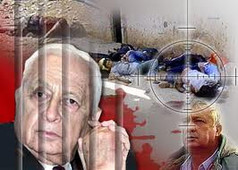
PARIS,(PIC)-- Five secret documents dating back to 1982 revealed clear US involvement in the Sabra and Shatila massacres that took place in 1982 over a three-day period from September 16-18.
The documents include verbatim transcripts of meetings between US and Israeli officials before and during the three-day massacre led by the right-wing Lebanese Christian Phalange militia that left roughly 2,000 people dead, mostly children, women and elderly men, New York Times revealed on the 30th anniversary of the Sabra and Shatila massacres.
The documents revealed that the Israelis misled American diplomats about events in Beirut and bullied them into accepting the spurious claim that thousands of “terrorists” were in the camps,” Seth Onziska, a doctoral candidate in international history at Columbia University and who obtained the documents, reported.
“Most troubling, when the United States was in a position to exert strong diplomatic pressure on Israel that could have ended the atrocities, it failed to do so,” the newspaper added.
On 16 September 1982, the first day of the massacre, US envoy to the Middle East Morris Draper met with Israeli Defense Minister Ariel Sharon who justified Israel's occupation of west Beirut by claiming that “2,000 to 3,000 terrorists” remained in that part of the city.
When Draper demanded that the Israeli forces immediately pull out of the area, Sharon responded with outrage: “I just don’t understand, what are you looking for? Do you want the terrorists to stay? Are you afraid that somebody will think that you were in collusion with us? Deny it. We denied it.”
According to the transcripts, Draper continued to insist that the Israelis leave, but eventually backed off once they agreed to a “gradual withdrawal” to allow for the Lebanese Army to enter the city. The Israelis insisted, however, that they wait 48 hours before allowing the plan to take effect.
Continuing his plea for some sign of an Israeli withdrawal, Draper warned that critics would say, “Sure, the I.D.F. is going to stay in West Beirut and they will let the Lebanese go and kill the Palestinians in the camps.” Sharon replied: “So, we’ll kill them. They will not be left there. You are not going to save them. You are not going to save these groups of the international terrorism.”
Draper's response was surprising when he said: “We are not interested in saving any of these people.”
Sharon declared: “If you don’t want the Lebanese to kill them, we will kill them.”
Draper then caught himself, and backtracked. He reminded the Israelis that the United States had painstakingly facilitated the P.L.O. exit from Beirut “so it wouldn’t be necessary for you to come in.” He added, “You should have stayed out.”
The documents include verbatim transcripts of meetings between US and Israeli officials before and during the three-day massacre led by the right-wing Lebanese Christian Phalange militia that left roughly 2,000 people dead, mostly children, women and elderly men, New York Times revealed on the 30th anniversary of the Sabra and Shatila massacres.
The documents revealed that the Israelis misled American diplomats about events in Beirut and bullied them into accepting the spurious claim that thousands of “terrorists” were in the camps,” Seth Onziska, a doctoral candidate in international history at Columbia University and who obtained the documents, reported.
“Most troubling, when the United States was in a position to exert strong diplomatic pressure on Israel that could have ended the atrocities, it failed to do so,” the newspaper added.
On 16 September 1982, the first day of the massacre, US envoy to the Middle East Morris Draper met with Israeli Defense Minister Ariel Sharon who justified Israel's occupation of west Beirut by claiming that “2,000 to 3,000 terrorists” remained in that part of the city.
When Draper demanded that the Israeli forces immediately pull out of the area, Sharon responded with outrage: “I just don’t understand, what are you looking for? Do you want the terrorists to stay? Are you afraid that somebody will think that you were in collusion with us? Deny it. We denied it.”
According to the transcripts, Draper continued to insist that the Israelis leave, but eventually backed off once they agreed to a “gradual withdrawal” to allow for the Lebanese Army to enter the city. The Israelis insisted, however, that they wait 48 hours before allowing the plan to take effect.
Continuing his plea for some sign of an Israeli withdrawal, Draper warned that critics would say, “Sure, the I.D.F. is going to stay in West Beirut and they will let the Lebanese go and kill the Palestinians in the camps.” Sharon replied: “So, we’ll kill them. They will not be left there. You are not going to save them. You are not going to save these groups of the international terrorism.”
Draper's response was surprising when he said: “We are not interested in saving any of these people.”
Sharon declared: “If you don’t want the Lebanese to kill them, we will kill them.”
Draper then caught himself, and backtracked. He reminded the Israelis that the United States had painstakingly facilitated the P.L.O. exit from Beirut “so it wouldn’t be necessary for you to come in.” He added, “You should have stayed out.”
UK silent on Sabra Shatila massacre
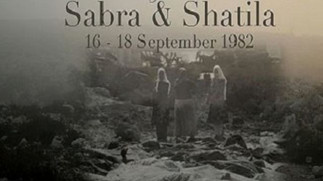
Britain went out of its way earlier this month to condemn the 1972 killing of 11 Israeli athletes, but it has failed to even raise the horrific Sabra and Shatila massacre of more than 3,000 Palestinian and Lebanese civilians by Israeli-affiliated terrorists ten years later.
The Israeli regime unleashed Phalange terrorists on Muslim residents of Sabra and Shatila refugee camps in the Lebanese capital of Beirut between September 16 and 18, 1982.
The terrorists entered the refugee camps, supposedly guarded by Israeli regime’s forces, on September 16, while Israeli troops fired flares to help attackers in their butchery of innocent Muslims including scores of children, women and old men.
As many as 3,500 people were slaughtered with many women raped before being killed.
In December 1982, the United Nations General Assembly condemned the massacre in Resolution 37/123 with a massive 123 yes votes, without any opposition as an act of “genocide,” for which the Israeli regime was implicitly blamed.
However, Britain joined hands with its western allies the US, Germany, Canada and France to abstain on the resolution apparently because Tel Aviv was indirectly blamed, while later in February 1983 the Israeli regime found -- in what British journalist David Hirst called a flawed inquiry full of omissions of evidence to rid the regime of full responsibility for the massacre -- that its forces were “indirectly” responsible for the butchery.
British Foreign Secretary William Hague said on the 40th anniversary of the Munich attacks on Israeli team members on September 5 that he and his colleagues “reiterate our determination to confront terrorism and stand with the victims of terrorism wherever it may occur.”
Nonetheless, Britain seems not to include victims of Israeli state terrorism in its list of terror victims, nor consider Palestinian and Lebanese civilians massacred by the regime both in 1982 and later in the 2008 Gaza Massacre as worthy of a “sad” remembrance.
The Israeli regime unleashed Phalange terrorists on Muslim residents of Sabra and Shatila refugee camps in the Lebanese capital of Beirut between September 16 and 18, 1982.
The terrorists entered the refugee camps, supposedly guarded by Israeli regime’s forces, on September 16, while Israeli troops fired flares to help attackers in their butchery of innocent Muslims including scores of children, women and old men.
As many as 3,500 people were slaughtered with many women raped before being killed.
In December 1982, the United Nations General Assembly condemned the massacre in Resolution 37/123 with a massive 123 yes votes, without any opposition as an act of “genocide,” for which the Israeli regime was implicitly blamed.
However, Britain joined hands with its western allies the US, Germany, Canada and France to abstain on the resolution apparently because Tel Aviv was indirectly blamed, while later in February 1983 the Israeli regime found -- in what British journalist David Hirst called a flawed inquiry full of omissions of evidence to rid the regime of full responsibility for the massacre -- that its forces were “indirectly” responsible for the butchery.
British Foreign Secretary William Hague said on the 40th anniversary of the Munich attacks on Israeli team members on September 5 that he and his colleagues “reiterate our determination to confront terrorism and stand with the victims of terrorism wherever it may occur.”
Nonetheless, Britain seems not to include victims of Israeli state terrorism in its list of terror victims, nor consider Palestinian and Lebanese civilians massacred by the regime both in 1982 and later in the 2008 Gaza Massacre as worthy of a “sad” remembrance.
16 sept 2012
Declassified Documents Shed Light on a 1982 Massacre
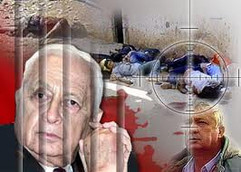
Thirty years ago, a massacre occurred in Beirut’s Sabra and Shatila refugee camps.
The following declassified documents reveal conversations between high-level American and Israeli officials before, during and after the event. These English-language documents were released by the Israel State Archives in Jerusalem earlier this year.
Sept. 16, 1982. This document contains the talking points and minutes of a conversation between the American under secretary of state, Lawrence Eagleburger, and the Israeli ambassador to the United States, Moshe Arens. There was a heated discussion about the Israeli occupation of West Beirut. The cover note (in Hebrew) was written by a young Benjamin Netanyahu, who was then Israel's deputy chief of mission in Washington and was present at the meeting. p. 1
Sept. 17, 1982. This document is a verbatim transcript of a meeting that took place while the massacre was in progress. Those in attendance included America's Middle East envoy, Morris Draper; Israel's defense minister, Ariel Sharon; Israel's foreign minister, Yitzhak Shamir; and several other important Israeli officials. Key passages can be found on pages 37-41 in this document viewer. p. 11
Sept. 18, 1982. This document chronicles a conversation between the American secretary of state, George P. Shultz, and the Israeli ambassador, Moshe Arens. This discussion took place on the day American officials discovered that a massacre had taken place. p. 45
A Preventable Massacre
ON the night of Sept. 16, 1982, the Israeli military allowed a right-wing Lebanese militia to enter two Palestinian refugee camps in Beirut. In the ensuing three-day rampage, the militia, linked to the Maronite Christian Phalange Party, raped, killed and dismembered at least 800 civilians, while Israeli flares illuminated the camps’ narrow and darkened alleyways. Nearly all of the dead were women, children and elderly men.
Thirty years later, the massacre at the Sabra and Shatila camps is remembered as a notorious chapter in modern Middle Eastern history, clouding the tortured relationships among Israel, the United States, Lebanon and the Palestinians. In 1983, an Israeli investigative commission concluded that Israeli leaders were “indirectly responsible” for the killings and that Ariel Sharon, then the defense minister and later prime minister, bore “personal responsibility” for failing to prevent them.
While Israel’s role in the massacre has been closely examined, America’s actions have never been fully understood. This summer, at the Israel State Archives, I found recently declassified documents that chronicle key conversations between American and Israeli officials before and during the 1982 massacre. The verbatim transcripts reveal that the Israelis misled American diplomats about events in Beirut and bullied them into accepting the spurious claim that thousands of “terrorists” were in the camps. Most troubling, when the United States was in a position to exert strong diplomatic pressure on Israel that could have ended the atrocities, it failed to do so. As a result, Phalange militiamen were able to murder Palestinian civilians, whom America had pledged to protect just weeks earlier.
Israel’s involvement in the Lebanese civil war began in June 1982, when it invaded its northern neighbor. Its goal was to root out the Palestine Liberation Organization, which had set up a state within a state, and to transform Lebanon into a Christian-ruled ally. The Israel Defense Forces soon besieged P.L.O.-controlled areas in the western part of Beirut. Intense Israeli bombardments led to heavy civilian casualties and tested even President Ronald Reagan, who initially backed Israel. In mid-August, as America was negotiating the P.L.O.’s withdrawal from Lebanon, Reagan told Prime Minister Menachem Begin that the bombings “had to stop or our entire future relationship was endangered,” Reagan wrote in his diaries.
The United States agreed to deploy Marines to Lebanon as part of a multinational force to supervise the P.L.O.’s departure, and by Sept. 1, thousands of its fighters — including Yasir Arafat — had left Beirut for various Arab countries. After America negotiated a cease-fire that included written guarantees to protect the Palestinian civilians remaining in the camps from vengeful Lebanese Christians, the Marines departed Beirut, on Sept. 10.
Israel hoped that Lebanon’s newly elected president, Bashir Gemayel, a Maronite, would support an Israeli-Christian alliance. But on Sept. 14, Gemayel was assassinated. Israel reacted by violating the cease-fire agreement. It quickly occupied West Beirut — ostensibly to prevent militia attacks against the Palestinian civilians. “The main order of the day is to keep the peace,” Begin told the American envoy to the Middle East, Morris Draper, on Sept. 15. “Otherwise, there could be pogroms.”
By Sept. 16, the I.D.F. was fully in control of West Beirut, including Sabra and Shatila. In Washington that same day, Under Secretary of State Lawrence S. Eagleburger told the Israeli ambassador, Moshe Arens, that “Israel’s credibility has been severely damaged” and that “we appear to some to be the victim of deliberate deception by Israel.” He demanded that Israel withdraw from West Beirut immediately.
In Tel Aviv, Mr. Draper and the American ambassador, Samuel W. Lewis, met with top Israeli officials. Contrary to Prime Minister Begin’s earlier assurances, Defense Minister Sharon said the occupation of West Beirut was justified because there were “2,000 to 3,000 terrorists who remained there.” Mr. Draper disputed this claim; having coordinated the August evacuation, he knew the number was minuscule. Mr. Draper said he was horrified to hear that Mr. Sharon was considering allowing the Phalange militia into West Beirut. Even the I.D.F. chief of staff, Rafael Eitan, acknowledged to the Americans that he feared “a relentless slaughter.”
On the evening of Sept. 16, the Israeli cabinet met and was informed that Phalange fighters were entering the Palestinian camps. Deputy Prime Minister David Levy worried aloud: “I know what the meaning of revenge is for them, what kind of slaughter. Then no one will believe we went in to create order there, and we will bear the blame.” That evening, word of civilian deaths began to filter out to Israeli military officials, politicians and journalists.
At 12:30 p.m. on Sept. 17, Foreign Minister Yitzhak Shamir hosted a meeting with Mr. Draper, Mr. Sharon and several Israeli intelligence chiefs. Mr. Shamir, having reportedly heard of a “slaughter” in the camps that morning, did not mention it.
The transcript of the Sept. 17 meeting reveals that the Americans were browbeaten by Mr. Sharon’s false insistence that “terrorists” needed “mopping up.” It also shows how Israel’s refusal to relinquish areas under its control, and its delays in coordinating with the Lebanese National Army, which the Americans wanted to step in, prolonged the slaughter.
Mr. Draper opened the meeting by demanding that the I.D.F. pull back right away. Mr. Sharon exploded, “I just don’t understand, what are you looking for? Do you want the terrorists to stay? Are you afraid that somebody will think that you were in collusion with us? Deny it. We denied it.” Mr. Draper, unmoved, kept pushing for definitive signs of a withdrawal. Mr. Sharon, who knew Phalange forces had already entered the camps, cynically told him, “Nothing will happen. Maybe some more terrorists will be killed. That will be to the benefit of all of us.” Mr. Shamir and Mr. Sharon finally agreed to gradually withdraw once the Lebanese Army started entering the city — but they insisted on waiting 48 hours (until the end of Rosh Hashana, which started that evening).
Continuing his plea for some sign of an Israeli withdrawal, Mr. Draper warned that critics would say, “Sure, the I.D.F. is going to stay in West Beirut and they will let the Lebanese go and kill the Palestinians in the camps.”
Mr. Sharon replied: “So, we’ll kill them. They will not be left there. You are not going to save them. You are not going to save these groups of the international terrorism.”
Mr. Draper responded: “We are not interested in saving any of these people.” Mr. Sharon declared: “If you don’t want the Lebanese to kill them, we will kill them.”
Mr. Draper then caught himself, and backtracked. He reminded the Israelis that the United States had painstakingly facilitated the P.L.O. exit from Beirut “so it wouldn’t be necessary for you to come in.” He added, “You should have stayed out.”
Mr. Sharon exploded again: “When it comes to our security, we have never asked. We will never ask. When it comes to existence and security, it is our own responsibility and we will never give it to anybody to decide for us.” The meeting ended with an agreement to coordinate withdrawal plans after Rosh Hashana.
By allowing the argument to proceed on Mr. Sharon’s terms, Mr. Draper effectively gave Israel cover to let the Phalange fighters remain in the camps. Fuller details of the massacre began to emerge on Sept. 18, when a young American diplomat, Ryan C. Crocker, visited the gruesome scene and reported back to Washington.
Years later, Mr. Draper called the massacre “obscene.” And in an oral history recorded a few years before his death in 2005, he remembered telling Mr. Sharon: “You should be ashamed. The situation is absolutely appalling. They’re killing children! You have the field completely under your control and are therefore responsible for that area.”
On Sept. 18, Reagan pronounced his “outrage and revulsion over the murders.” He said the United States had opposed Israel’s invasion of Beirut, both because “we believed it wrong in principle and for fear that it would provoke further fighting.” Secretary of State George P. Shultz later admitted that “we are partially responsible” because “we took the Israelis and the Lebanese at their word.” He summoned Ambassador Arens. “When you take military control over a city, you’re responsible for what happens,” he told him. “Now we have a massacre.”
But the belated expression of shock and dismay belies the Americans’ failed diplomatic effort during the massacre. The transcript of Mr. Draper’s meeting with the Israelis demonstrates how the United States was unwittingly complicit in the tragedy of Sabra and Shatila.
Ambassador Lewis, now retired, told me that the massacre would have been hard to prevent “unless Reagan had picked up the phone and called Begin and read him the riot act even more clearly than he already did in August — that might have stopped it temporarily.” But “Sharon would have found some other way” for the militiamen to take action, Mr. Lewis added.
Nicholas A. Veliotes, then the assistant secretary of state for Near Eastern affairs, agreed. “Vintage Sharon,” he said, after I read the transcript to him. “It is his way or the highway.”
The Sabra and Shatila massacre severely undercut America’s influence in the Middle East, and its moral authority plummeted. In the aftermath of the massacre, the United States felt compelled by “guilt” to redeploy the Marines, who ended up without a clear mission, in the midst of a brutal civil war.
On Oct. 23, 1983, the Marine barracks in Beirut were bombed and 241 Marines were killed. The attack led to open warfare with Syrian-backed forces and, soon after, the rapid withdrawal of the Marines to their ships. As Mr. Lewis told me, America left Lebanon “with our tail between our legs.”
The archival record reveals the magnitude of a deception that undermined American efforts to avoid bloodshed. Working with only partial knowledge of the reality on the ground, the United States feebly yielded to false arguments and stalling tactics that allowed a massacre in progress to proceed.
The lesson of the Sabra and Shatila tragedy is clear. Sometimes close allies act contrary to American interests and values. Failing to exert American power to uphold those interests and values can have disastrous consequences: for our allies, for our moral standing and most important, for the innocent people who pay the highest price of all.
The following declassified documents reveal conversations between high-level American and Israeli officials before, during and after the event. These English-language documents were released by the Israel State Archives in Jerusalem earlier this year.
Sept. 16, 1982. This document contains the talking points and minutes of a conversation between the American under secretary of state, Lawrence Eagleburger, and the Israeli ambassador to the United States, Moshe Arens. There was a heated discussion about the Israeli occupation of West Beirut. The cover note (in Hebrew) was written by a young Benjamin Netanyahu, who was then Israel's deputy chief of mission in Washington and was present at the meeting. p. 1
Sept. 17, 1982. This document is a verbatim transcript of a meeting that took place while the massacre was in progress. Those in attendance included America's Middle East envoy, Morris Draper; Israel's defense minister, Ariel Sharon; Israel's foreign minister, Yitzhak Shamir; and several other important Israeli officials. Key passages can be found on pages 37-41 in this document viewer. p. 11
Sept. 18, 1982. This document chronicles a conversation between the American secretary of state, George P. Shultz, and the Israeli ambassador, Moshe Arens. This discussion took place on the day American officials discovered that a massacre had taken place. p. 45
A Preventable Massacre
ON the night of Sept. 16, 1982, the Israeli military allowed a right-wing Lebanese militia to enter two Palestinian refugee camps in Beirut. In the ensuing three-day rampage, the militia, linked to the Maronite Christian Phalange Party, raped, killed and dismembered at least 800 civilians, while Israeli flares illuminated the camps’ narrow and darkened alleyways. Nearly all of the dead were women, children and elderly men.
Thirty years later, the massacre at the Sabra and Shatila camps is remembered as a notorious chapter in modern Middle Eastern history, clouding the tortured relationships among Israel, the United States, Lebanon and the Palestinians. In 1983, an Israeli investigative commission concluded that Israeli leaders were “indirectly responsible” for the killings and that Ariel Sharon, then the defense minister and later prime minister, bore “personal responsibility” for failing to prevent them.
While Israel’s role in the massacre has been closely examined, America’s actions have never been fully understood. This summer, at the Israel State Archives, I found recently declassified documents that chronicle key conversations between American and Israeli officials before and during the 1982 massacre. The verbatim transcripts reveal that the Israelis misled American diplomats about events in Beirut and bullied them into accepting the spurious claim that thousands of “terrorists” were in the camps. Most troubling, when the United States was in a position to exert strong diplomatic pressure on Israel that could have ended the atrocities, it failed to do so. As a result, Phalange militiamen were able to murder Palestinian civilians, whom America had pledged to protect just weeks earlier.
Israel’s involvement in the Lebanese civil war began in June 1982, when it invaded its northern neighbor. Its goal was to root out the Palestine Liberation Organization, which had set up a state within a state, and to transform Lebanon into a Christian-ruled ally. The Israel Defense Forces soon besieged P.L.O.-controlled areas in the western part of Beirut. Intense Israeli bombardments led to heavy civilian casualties and tested even President Ronald Reagan, who initially backed Israel. In mid-August, as America was negotiating the P.L.O.’s withdrawal from Lebanon, Reagan told Prime Minister Menachem Begin that the bombings “had to stop or our entire future relationship was endangered,” Reagan wrote in his diaries.
The United States agreed to deploy Marines to Lebanon as part of a multinational force to supervise the P.L.O.’s departure, and by Sept. 1, thousands of its fighters — including Yasir Arafat — had left Beirut for various Arab countries. After America negotiated a cease-fire that included written guarantees to protect the Palestinian civilians remaining in the camps from vengeful Lebanese Christians, the Marines departed Beirut, on Sept. 10.
Israel hoped that Lebanon’s newly elected president, Bashir Gemayel, a Maronite, would support an Israeli-Christian alliance. But on Sept. 14, Gemayel was assassinated. Israel reacted by violating the cease-fire agreement. It quickly occupied West Beirut — ostensibly to prevent militia attacks against the Palestinian civilians. “The main order of the day is to keep the peace,” Begin told the American envoy to the Middle East, Morris Draper, on Sept. 15. “Otherwise, there could be pogroms.”
By Sept. 16, the I.D.F. was fully in control of West Beirut, including Sabra and Shatila. In Washington that same day, Under Secretary of State Lawrence S. Eagleburger told the Israeli ambassador, Moshe Arens, that “Israel’s credibility has been severely damaged” and that “we appear to some to be the victim of deliberate deception by Israel.” He demanded that Israel withdraw from West Beirut immediately.
In Tel Aviv, Mr. Draper and the American ambassador, Samuel W. Lewis, met with top Israeli officials. Contrary to Prime Minister Begin’s earlier assurances, Defense Minister Sharon said the occupation of West Beirut was justified because there were “2,000 to 3,000 terrorists who remained there.” Mr. Draper disputed this claim; having coordinated the August evacuation, he knew the number was minuscule. Mr. Draper said he was horrified to hear that Mr. Sharon was considering allowing the Phalange militia into West Beirut. Even the I.D.F. chief of staff, Rafael Eitan, acknowledged to the Americans that he feared “a relentless slaughter.”
On the evening of Sept. 16, the Israeli cabinet met and was informed that Phalange fighters were entering the Palestinian camps. Deputy Prime Minister David Levy worried aloud: “I know what the meaning of revenge is for them, what kind of slaughter. Then no one will believe we went in to create order there, and we will bear the blame.” That evening, word of civilian deaths began to filter out to Israeli military officials, politicians and journalists.
At 12:30 p.m. on Sept. 17, Foreign Minister Yitzhak Shamir hosted a meeting with Mr. Draper, Mr. Sharon and several Israeli intelligence chiefs. Mr. Shamir, having reportedly heard of a “slaughter” in the camps that morning, did not mention it.
The transcript of the Sept. 17 meeting reveals that the Americans were browbeaten by Mr. Sharon’s false insistence that “terrorists” needed “mopping up.” It also shows how Israel’s refusal to relinquish areas under its control, and its delays in coordinating with the Lebanese National Army, which the Americans wanted to step in, prolonged the slaughter.
Mr. Draper opened the meeting by demanding that the I.D.F. pull back right away. Mr. Sharon exploded, “I just don’t understand, what are you looking for? Do you want the terrorists to stay? Are you afraid that somebody will think that you were in collusion with us? Deny it. We denied it.” Mr. Draper, unmoved, kept pushing for definitive signs of a withdrawal. Mr. Sharon, who knew Phalange forces had already entered the camps, cynically told him, “Nothing will happen. Maybe some more terrorists will be killed. That will be to the benefit of all of us.” Mr. Shamir and Mr. Sharon finally agreed to gradually withdraw once the Lebanese Army started entering the city — but they insisted on waiting 48 hours (until the end of Rosh Hashana, which started that evening).
Continuing his plea for some sign of an Israeli withdrawal, Mr. Draper warned that critics would say, “Sure, the I.D.F. is going to stay in West Beirut and they will let the Lebanese go and kill the Palestinians in the camps.”
Mr. Sharon replied: “So, we’ll kill them. They will not be left there. You are not going to save them. You are not going to save these groups of the international terrorism.”
Mr. Draper responded: “We are not interested in saving any of these people.” Mr. Sharon declared: “If you don’t want the Lebanese to kill them, we will kill them.”
Mr. Draper then caught himself, and backtracked. He reminded the Israelis that the United States had painstakingly facilitated the P.L.O. exit from Beirut “so it wouldn’t be necessary for you to come in.” He added, “You should have stayed out.”
Mr. Sharon exploded again: “When it comes to our security, we have never asked. We will never ask. When it comes to existence and security, it is our own responsibility and we will never give it to anybody to decide for us.” The meeting ended with an agreement to coordinate withdrawal plans after Rosh Hashana.
By allowing the argument to proceed on Mr. Sharon’s terms, Mr. Draper effectively gave Israel cover to let the Phalange fighters remain in the camps. Fuller details of the massacre began to emerge on Sept. 18, when a young American diplomat, Ryan C. Crocker, visited the gruesome scene and reported back to Washington.
Years later, Mr. Draper called the massacre “obscene.” And in an oral history recorded a few years before his death in 2005, he remembered telling Mr. Sharon: “You should be ashamed. The situation is absolutely appalling. They’re killing children! You have the field completely under your control and are therefore responsible for that area.”
On Sept. 18, Reagan pronounced his “outrage and revulsion over the murders.” He said the United States had opposed Israel’s invasion of Beirut, both because “we believed it wrong in principle and for fear that it would provoke further fighting.” Secretary of State George P. Shultz later admitted that “we are partially responsible” because “we took the Israelis and the Lebanese at their word.” He summoned Ambassador Arens. “When you take military control over a city, you’re responsible for what happens,” he told him. “Now we have a massacre.”
But the belated expression of shock and dismay belies the Americans’ failed diplomatic effort during the massacre. The transcript of Mr. Draper’s meeting with the Israelis demonstrates how the United States was unwittingly complicit in the tragedy of Sabra and Shatila.
Ambassador Lewis, now retired, told me that the massacre would have been hard to prevent “unless Reagan had picked up the phone and called Begin and read him the riot act even more clearly than he already did in August — that might have stopped it temporarily.” But “Sharon would have found some other way” for the militiamen to take action, Mr. Lewis added.
Nicholas A. Veliotes, then the assistant secretary of state for Near Eastern affairs, agreed. “Vintage Sharon,” he said, after I read the transcript to him. “It is his way or the highway.”
The Sabra and Shatila massacre severely undercut America’s influence in the Middle East, and its moral authority plummeted. In the aftermath of the massacre, the United States felt compelled by “guilt” to redeploy the Marines, who ended up without a clear mission, in the midst of a brutal civil war.
On Oct. 23, 1983, the Marine barracks in Beirut were bombed and 241 Marines were killed. The attack led to open warfare with Syrian-backed forces and, soon after, the rapid withdrawal of the Marines to their ships. As Mr. Lewis told me, America left Lebanon “with our tail between our legs.”
The archival record reveals the magnitude of a deception that undermined American efforts to avoid bloodshed. Working with only partial knowledge of the reality on the ground, the United States feebly yielded to false arguments and stalling tactics that allowed a massacre in progress to proceed.
The lesson of the Sabra and Shatila tragedy is clear. Sometimes close allies act contrary to American interests and values. Failing to exert American power to uphold those interests and values can have disastrous consequences: for our allies, for our moral standing and most important, for the innocent people who pay the highest price of all.
Gaza-based poet remembers Sabra and Shatila massacre
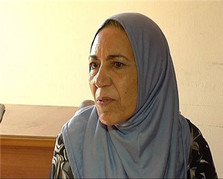
Rihab Kanaan lost 51 relatives in the Tel al-Zaatar massacre in 1976
GAZA CITY (Ma'an) -- Rihab Kanaan bursts into tears while talking to Ma'an's reporter in Gaza about the trauma she suffered after losing her son and dozens of family members in the notorious Tel al-Zaatar and Sabra and Shatila massacres during Lebanon's civil war.
The Gaza-based poet says the Palestinian leadership has forgotten about the Sabra and Shatila massacre in which an estimated 800-3,000 Palestinian civilians were killed by Lebanese Christian militias over a three day period on September 16, 1982.
"I will hold two candles and a poster on which I will write: We are the martyrs of Sabra and Shatila, don’t forget us. I will stand in the Unknown Soldier Square in commemoration of my son Mahir and all martyrs," she said.
Kanaan witnessed the Tel al-Zaatar refugee camp massacre during Lebanon's civil war in 1976 and later wrote a book about the events.
She lost 51 relatives when the Beirut camp was besieged by Lebanese armed forces.
Years later, the Palestinian poet lost her son Mahir and two cousins in events in Sabra and Shatila.
"He was going to buy bread when they killed him inside the camp’s mosque before the very eyes of his sister. Up until now, when I see a mosque, I remember how Mahir died."
Kanaan was living with her second husband near the Arab University of Beirut at the time of the attack and remembers the tensions in Lebanese society.
"We knew there were signs of unrest especially after the speeches of Bachir Gemayel. Then after Gemayel was assassinated, we were sure there would be a massacre, but we never imagined it would be as horrible and as big as that," she says.
"When I was there, I heard about the massacre. I tried to go to Shatila, but I couldn't. After some effort, I managed to reach the outskirts of the camp where I saw the dead bodies and the atrocious scenes. The stories I heard from witnesses were too horrible that I couldn’t continue to listen," she recounts.
Kanaan was certain her daughter had also been killed in the massacre and amid the confusion afterwards was unable to find out what happened to her. It was only some years later that she found out that her daughter Maymana had survived the attack and was taken care of by neighbors.
Palestinian resistance fighters had already left the camp before the massacre, leaving only unarmed men, women and children, Kanaan said.
Several years after the attack, Kanaan moved to the Gaza Strip. As another anniversary of the massacre passes, she is calling upon international human rights groups, together with Arab states, to hold the perpetrators accountable.
"Two years ago, I visited Lebanon to pray to God on behalf of the martyrs from my family, and it was painful to see that nothing has changed in Sabra and Shatila," she says.
"Life is still intolerable in all refugee camps, but people are still dreaming they can return to their homeland."
The massacre took place after the Israeli invasion of Lebanon, when Christian Phalangist militias entered the Beirut camp under Israeli military watch to wreak retribution for the alleged assassination of their leader Bachir Gemayel.
Over three days, Palestinian refugees were killed in droves. At the time, the number of dead was estimated at 700, but eyewitness British reporter Robert Fisk says the number is closer to 1,700.
The Palestinian Red Crescent estimates that around 3,000 civilians were killed.
GAZA CITY (Ma'an) -- Rihab Kanaan bursts into tears while talking to Ma'an's reporter in Gaza about the trauma she suffered after losing her son and dozens of family members in the notorious Tel al-Zaatar and Sabra and Shatila massacres during Lebanon's civil war.
The Gaza-based poet says the Palestinian leadership has forgotten about the Sabra and Shatila massacre in which an estimated 800-3,000 Palestinian civilians were killed by Lebanese Christian militias over a three day period on September 16, 1982.
"I will hold two candles and a poster on which I will write: We are the martyrs of Sabra and Shatila, don’t forget us. I will stand in the Unknown Soldier Square in commemoration of my son Mahir and all martyrs," she said.
Kanaan witnessed the Tel al-Zaatar refugee camp massacre during Lebanon's civil war in 1976 and later wrote a book about the events.
She lost 51 relatives when the Beirut camp was besieged by Lebanese armed forces.
Years later, the Palestinian poet lost her son Mahir and two cousins in events in Sabra and Shatila.
"He was going to buy bread when they killed him inside the camp’s mosque before the very eyes of his sister. Up until now, when I see a mosque, I remember how Mahir died."
Kanaan was living with her second husband near the Arab University of Beirut at the time of the attack and remembers the tensions in Lebanese society.
"We knew there were signs of unrest especially after the speeches of Bachir Gemayel. Then after Gemayel was assassinated, we were sure there would be a massacre, but we never imagined it would be as horrible and as big as that," she says.
"When I was there, I heard about the massacre. I tried to go to Shatila, but I couldn't. After some effort, I managed to reach the outskirts of the camp where I saw the dead bodies and the atrocious scenes. The stories I heard from witnesses were too horrible that I couldn’t continue to listen," she recounts.
Kanaan was certain her daughter had also been killed in the massacre and amid the confusion afterwards was unable to find out what happened to her. It was only some years later that she found out that her daughter Maymana had survived the attack and was taken care of by neighbors.
Palestinian resistance fighters had already left the camp before the massacre, leaving only unarmed men, women and children, Kanaan said.
Several years after the attack, Kanaan moved to the Gaza Strip. As another anniversary of the massacre passes, she is calling upon international human rights groups, together with Arab states, to hold the perpetrators accountable.
"Two years ago, I visited Lebanon to pray to God on behalf of the martyrs from my family, and it was painful to see that nothing has changed in Sabra and Shatila," she says.
"Life is still intolerable in all refugee camps, but people are still dreaming they can return to their homeland."
The massacre took place after the Israeli invasion of Lebanon, when Christian Phalangist militias entered the Beirut camp under Israeli military watch to wreak retribution for the alleged assassination of their leader Bachir Gemayel.
Over three days, Palestinian refugees were killed in droves. At the time, the number of dead was estimated at 700, but eyewitness British reporter Robert Fisk says the number is closer to 1,700.
The Palestinian Red Crescent estimates that around 3,000 civilians were killed.
15 sept 2012
Israeli spy drone violates Lebanese airspace
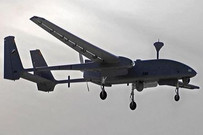
An Israeli reconnaissance plane has penetrated Lebanese airspace and flown over parts of the country in flagrant violation of a UN Security Council resolution.
The unmanned aerial vehicle crossed into Lebanon's airspace over the southern village of al-Naqoura, which is situated 91 kilometers (57 miles) south of Beirut, at 6:15 a.m. local time (0315 GMT) on Saturday, according to a statement issued by the Lebanese military on Saturday.
The remote-controlled aircraft carried out surveillance flights over several areas in southern Lebanon, including the towns of Riyaq and Baalbek, before it left Lebanese airspace at 11:05 a.m. local time (0805 GMT) while flying over the southern sector of Lebanon.
Israel violates Lebanon's airspace on an almost daily basis, claiming the flights serve surveillance purposes.
Lebanon's government, the Hezbollah resistance movement, and the UN Interim Force in Lebanon, known as UNIFIL, have repeatedly condemned the overflights, saying they are in clear violation of UN Resolution 1701 and the country's sovereignty.
UN Security Council Resolution 1701, which brokered a ceasefire in the war of aggression Israel launched against Lebanon in 2006, calls on Israel to respect Lebanon's sovereignty and territorial integrity.
In 2009, Lebanon filed a complaint with the United Nations, presenting over 7,000 documents pertaining to Israeli violations of Lebanese territory.
The unmanned aerial vehicle crossed into Lebanon's airspace over the southern village of al-Naqoura, which is situated 91 kilometers (57 miles) south of Beirut, at 6:15 a.m. local time (0315 GMT) on Saturday, according to a statement issued by the Lebanese military on Saturday.
The remote-controlled aircraft carried out surveillance flights over several areas in southern Lebanon, including the towns of Riyaq and Baalbek, before it left Lebanese airspace at 11:05 a.m. local time (0805 GMT) while flying over the southern sector of Lebanon.
Israel violates Lebanon's airspace on an almost daily basis, claiming the flights serve surveillance purposes.
Lebanon's government, the Hezbollah resistance movement, and the UN Interim Force in Lebanon, known as UNIFIL, have repeatedly condemned the overflights, saying they are in clear violation of UN Resolution 1701 and the country's sovereignty.
UN Security Council Resolution 1701, which brokered a ceasefire in the war of aggression Israel launched against Lebanon in 2006, calls on Israel to respect Lebanon's sovereignty and territorial integrity.
In 2009, Lebanon filed a complaint with the United Nations, presenting over 7,000 documents pertaining to Israeli violations of Lebanese territory.
11 sept 2012
Israeli military aircraft cross into Lebanon airspace
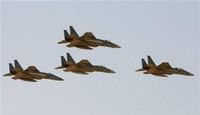
Four Israeli military aircraft have entered Lebanese airspace and flown over areas of the country in blatant violation of a UN Security Council resolution.
An Israeli reconnaissance plane crossed into Lebanese airspace over the southern border town of Alma al-Shaab at 7:35 local time (0435 GMT) on Monday, according to a statement issued by the Lebanese military.
The remote-controlled aircraft made surveillance flights over several areas in southern Lebanon before it left Lebanese airspace at 7:15 p.m. local time (1615 GMT) while flying over the southern village of Rmeish.
On Tuesday, an Israeli drone violated Lebanese airspace over the southern village of al-Naqoura, situated 91 kilometers (57 miles) south of Beirut, at 6:30 a.m. local time (0330 GMT) and flew over several areas of southern Lebanon.
The Israeli aircraft left Lebanese airspace at around 1:30 p.m. local time (1030 GMT) while flying over Rmeish village.
Later in the day, two Israeli fighter jets breached Lebanon's airspace over the border village of Kfar Kila, located 96 kilometers (59 miles) south of Beirut, at 10:40 a.m. local time (0740 GMT). The warplanes left Lebanese airspace at 12:20 p.m. (0920 GMT) local time.
Israel violates Lebanon's airspace on an almost daily basis, claiming the flights serve surveillance purposes.
Lebanon's government, the Hezbollah resistance movement, and the UN Interim Force in Lebanon, known as UNIFIL, have repeatedly condemned the overflights, saying they are in clear violation of UN Resolution 1701 and the country's sovereignty.
UN Security Council Resolution 1701, which brokered a ceasefire in the war of aggression Israel launched against Lebanon in 2006, calls on Israel to respect Lebanon's sovereignty and territorial integrity.
In 2009, Lebanon filed a complaint with the United Nations, presenting over 7,000 documents pertaining to Israeli violations of Lebanese territory.
An Israeli reconnaissance plane crossed into Lebanese airspace over the southern border town of Alma al-Shaab at 7:35 local time (0435 GMT) on Monday, according to a statement issued by the Lebanese military.
The remote-controlled aircraft made surveillance flights over several areas in southern Lebanon before it left Lebanese airspace at 7:15 p.m. local time (1615 GMT) while flying over the southern village of Rmeish.
On Tuesday, an Israeli drone violated Lebanese airspace over the southern village of al-Naqoura, situated 91 kilometers (57 miles) south of Beirut, at 6:30 a.m. local time (0330 GMT) and flew over several areas of southern Lebanon.
The Israeli aircraft left Lebanese airspace at around 1:30 p.m. local time (1030 GMT) while flying over Rmeish village.
Later in the day, two Israeli fighter jets breached Lebanon's airspace over the border village of Kfar Kila, located 96 kilometers (59 miles) south of Beirut, at 10:40 a.m. local time (0740 GMT). The warplanes left Lebanese airspace at 12:20 p.m. (0920 GMT) local time.
Israel violates Lebanon's airspace on an almost daily basis, claiming the flights serve surveillance purposes.
Lebanon's government, the Hezbollah resistance movement, and the UN Interim Force in Lebanon, known as UNIFIL, have repeatedly condemned the overflights, saying they are in clear violation of UN Resolution 1701 and the country's sovereignty.
UN Security Council Resolution 1701, which brokered a ceasefire in the war of aggression Israel launched against Lebanon in 2006, calls on Israel to respect Lebanon's sovereignty and territorial integrity.
In 2009, Lebanon filed a complaint with the United Nations, presenting over 7,000 documents pertaining to Israeli violations of Lebanese territory.
9 sept 2012
Israeli spy drone infringes upon Lebanon airspace
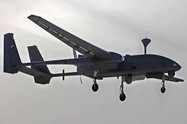
An Israeli reconnaissance drone has crossed into Lebanese airspace and flown over parts of the country in blatant violation of a UN Security Council resolution.
The unmanned aerial vehicle violated Lebanese airspace over the southern village of al-Naqoura, which is situated 91 kilometers (57 miles) south of Beirut, at 1:25 p.m. local time (1025 GMT) on Saturday, according to a statement issued by the Lebanese military.
The remote-controlled aircraft made surveillance flights over several areas in southern Lebanon before it left Lebanese airspace at 4:20 p.m. local time (1320 GMT) while flying over the southern sector of Lebanon.
Israel violates Lebanon's airspace on an almost daily basis, claiming the flights serve surveillance purposes.
Lebanon's government, the Hezbollah resistance movement, and the UN Interim Force in Lebanon, known as UNIFIL, have repeatedly condemned the overflights, saying they are in clear violation of UN Resolution 1701 and the country's sovereignty.
UN Security Council Resolution 1701, which brokered a ceasefire in the war of aggression Israel launched against Lebanon in 2006, calls on Israel to respect Lebanon's sovereignty and territorial integrity.
In 2009, Lebanon filed a complaint with the United Nations, presenting over 7,000 documents pertaining to Israeli violations of Lebanese territory.
The unmanned aerial vehicle violated Lebanese airspace over the southern village of al-Naqoura, which is situated 91 kilometers (57 miles) south of Beirut, at 1:25 p.m. local time (1025 GMT) on Saturday, according to a statement issued by the Lebanese military.
The remote-controlled aircraft made surveillance flights over several areas in southern Lebanon before it left Lebanese airspace at 4:20 p.m. local time (1320 GMT) while flying over the southern sector of Lebanon.
Israel violates Lebanon's airspace on an almost daily basis, claiming the flights serve surveillance purposes.
Lebanon's government, the Hezbollah resistance movement, and the UN Interim Force in Lebanon, known as UNIFIL, have repeatedly condemned the overflights, saying they are in clear violation of UN Resolution 1701 and the country's sovereignty.
UN Security Council Resolution 1701, which brokered a ceasefire in the war of aggression Israel launched against Lebanon in 2006, calls on Israel to respect Lebanon's sovereignty and territorial integrity.
In 2009, Lebanon filed a complaint with the United Nations, presenting over 7,000 documents pertaining to Israeli violations of Lebanese territory.
8 sept 2012
Israeli spy drone violates Lebanese airspace
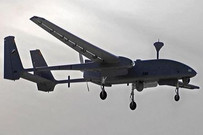
An Israeli reconnaissance plane has penetrated Lebanese airspace and flown over parts of the country in flagrant violation of a UN Security Council resolution.
The unmanned aerial vehicle crossed into Lebanon's airspace over the southern village of al-Naqoura, which is situated 91 kilometers (57 miles) south of Beirut, at 7:35 a.m. on Friday, according to a statement issued by the Lebanese military on Saturday.
The remote-controlled aircraft carried out surveillance flights over several areas in southern Lebanon, including the towns of Riyaq and Baalbek, before it left Lebanese airspace at 8:30 p.m. local time (1730 GMT) while flying over the southern sector of Lebanon.
Israel violates Lebanon's airspace on an almost daily basis, claiming the flights serve surveillance purposes.
Lebanon's government, the Hezbollah resistance movement, and the UN Interim Force in Lebanon, known as UNIFIL, have repeatedly condemned the overflights, saying they are in clear violation of UN Resolution 1701 and the country's sovereignty.
UN Security Council Resolution 1701, which brokered a ceasefire in the war of aggression Israel launched against Lebanon in 2006, calls on Israel to respect Lebanon's sovereignty and territorial integrity.
In 2009, Lebanon filed a complaint with the United Nations, presenting over 7,000 documents pertaining to Israeli violations of Lebanese territory.
The unmanned aerial vehicle crossed into Lebanon's airspace over the southern village of al-Naqoura, which is situated 91 kilometers (57 miles) south of Beirut, at 7:35 a.m. on Friday, according to a statement issued by the Lebanese military on Saturday.
The remote-controlled aircraft carried out surveillance flights over several areas in southern Lebanon, including the towns of Riyaq and Baalbek, before it left Lebanese airspace at 8:30 p.m. local time (1730 GMT) while flying over the southern sector of Lebanon.
Israel violates Lebanon's airspace on an almost daily basis, claiming the flights serve surveillance purposes.
Lebanon's government, the Hezbollah resistance movement, and the UN Interim Force in Lebanon, known as UNIFIL, have repeatedly condemned the overflights, saying they are in clear violation of UN Resolution 1701 and the country's sovereignty.
UN Security Council Resolution 1701, which brokered a ceasefire in the war of aggression Israel launched against Lebanon in 2006, calls on Israel to respect Lebanon's sovereignty and territorial integrity.
In 2009, Lebanon filed a complaint with the United Nations, presenting over 7,000 documents pertaining to Israeli violations of Lebanese territory.
4 sept 2012
Two Israeli drones violate Lebanese airspace
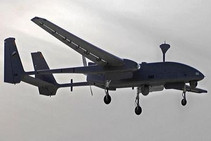
Two Israeli reconnaissance drones have penetrated Lebanese airspace and flown over areas of the country in blatant violation of a UN Security Council resolution.
An Israeli remote-controlled aerial vehicle crossed into Lebanese airspace over the southern border village of far Kila, located 96 kilometers (59 miles) south of Beirut, at 8 a.m. local time (0500 GMT) on Tuesday, according to a statement issued by the Lebanese military.
The military aircraft made surveillance flights over several areas in southern Lebanon and Beirut before it left Lebanese airspace at 3:10 p.m. local time (1210 GMT) while flying over the southern border town of Alma al-Shaab.
On Monday, an Israeli drone breached Lebanon's airspace over the southern village of al-Naqoura, which is situated 91 kilometers (57 miles) south of Beirut, at 6:55 p.m. local time (1555 GMT) and flew over several areas of Lebanon.
The Israeli aircraft left Lebanese airspace at 6:35 a.m. local time (0335 GMT) on Tuesday.
Israel violates Lebanon's airspace on an almost daily basis, claiming the flights serve surveillance purposes.
Lebanon's government, the Hezbollah resistance movement, and the UN Interim Force in Lebanon, known as UNIFIL, have repeatedly condemned the overflights, saying they are in clear violation of UN Resolution 1701 and the country's sovereignty.
UN Security Council Resolution 1701, which brokered a ceasefire in the war of aggression Israel launched against Lebanon in 2006, calls on Israel to respect Lebanon's sovereignty and territorial integrity.
In 2009, Lebanon filed a complaint with the United Nations, presenting over 7,000 documents pertaining to Israeli violations of Lebanese territory.
An Israeli remote-controlled aerial vehicle crossed into Lebanese airspace over the southern border village of far Kila, located 96 kilometers (59 miles) south of Beirut, at 8 a.m. local time (0500 GMT) on Tuesday, according to a statement issued by the Lebanese military.
The military aircraft made surveillance flights over several areas in southern Lebanon and Beirut before it left Lebanese airspace at 3:10 p.m. local time (1210 GMT) while flying over the southern border town of Alma al-Shaab.
On Monday, an Israeli drone breached Lebanon's airspace over the southern village of al-Naqoura, which is situated 91 kilometers (57 miles) south of Beirut, at 6:55 p.m. local time (1555 GMT) and flew over several areas of Lebanon.
The Israeli aircraft left Lebanese airspace at 6:35 a.m. local time (0335 GMT) on Tuesday.
Israel violates Lebanon's airspace on an almost daily basis, claiming the flights serve surveillance purposes.
Lebanon's government, the Hezbollah resistance movement, and the UN Interim Force in Lebanon, known as UNIFIL, have repeatedly condemned the overflights, saying they are in clear violation of UN Resolution 1701 and the country's sovereignty.
UN Security Council Resolution 1701, which brokered a ceasefire in the war of aggression Israel launched against Lebanon in 2006, calls on Israel to respect Lebanon's sovereignty and territorial integrity.
In 2009, Lebanon filed a complaint with the United Nations, presenting over 7,000 documents pertaining to Israeli violations of Lebanese territory.
Unexploded Israeli cluster bomb kills Lebanese woman
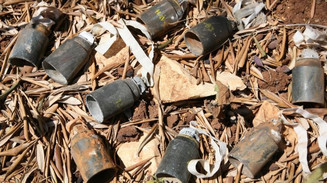
A file photo shows unexploded cluster bombs in southern Lebanon after Israel bombardments on the region in 2006.
A woman has been killed and a soldier seriously injured after an unexploded cluster bomb detonated in Nabatiye Governorate in southern Lebanon, Press TV reports.
The incident occurred on Tuesday when a bomblet exploded in Bint Jbeil, the second largest town in the in southern Lebanon.
The injured soldier was rushed to the nearest hospital.
US reports say Israel dropped some 4.5 million cluster munitions in Lebanon during the last days of its military offensive on the country in 2006.
The move made Lebanon one of the worst affected countries by the internationally-banned arms, along with Iraq, Afghanistan and now Libya.
Eight years after the 2006 war, Lebanon has not yet finished clearing the cluster munitions and landmines in the south, with Israel refusing to provide UN authorities with maps of the locations of the munitions it dropped.
A woman has been killed and a soldier seriously injured after an unexploded cluster bomb detonated in Nabatiye Governorate in southern Lebanon, Press TV reports.
The incident occurred on Tuesday when a bomblet exploded in Bint Jbeil, the second largest town in the in southern Lebanon.
The injured soldier was rushed to the nearest hospital.
US reports say Israel dropped some 4.5 million cluster munitions in Lebanon during the last days of its military offensive on the country in 2006.
The move made Lebanon one of the worst affected countries by the internationally-banned arms, along with Iraq, Afghanistan and now Libya.
Eight years after the 2006 war, Lebanon has not yet finished clearing the cluster munitions and landmines in the south, with Israel refusing to provide UN authorities with maps of the locations of the munitions it dropped.
2 sept 2012
Four Israeli fighter jets violate Lebanese airspace
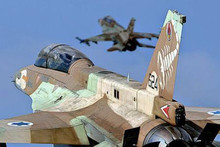
Four Israeli fighter jets have penetrated Lebanese airspace and flown over parts of the country in flagrant violation of a UN Security Council resolution.
The military aircraft violated Lebanese airspace over the southern border village of Kfar Kila, located 96 kilometers (59 miles) south of Beirut, at 10:15 a.m. local time (0715 GMT) on Sunday, according to a statement issued by the Lebanese military.
The warplanes flew over several areas in southern Lebanon before they left Lebanese airspace at 12 p.m. local time (0900 GMT), while flying over the border town of Alma al-Shaab.
Israel violates Lebanon's airspace on an almost daily basis, claiming the flights serve surveillance purposes.
Lebanon's government, the Hezbollah resistance movement, and the UN Interim Force in Lebanon, known as UNIFIL, have repeatedly condemned the overflights, saying they are in clear violation of UN Resolution 1701 and the country's sovereignty.
UN Security Council Resolution 1701, which brokered a ceasefire in the war of aggression Israel launched against Lebanon in 2006, calls on Israel to respect Lebanon's sovereignty and territorial integrity.
In 2009, Lebanon filed a complaint with the United Nations, presenting over 7,000 documents pertaining to Israeli violations of Lebanese territory.
The military aircraft violated Lebanese airspace over the southern border village of Kfar Kila, located 96 kilometers (59 miles) south of Beirut, at 10:15 a.m. local time (0715 GMT) on Sunday, according to a statement issued by the Lebanese military.
The warplanes flew over several areas in southern Lebanon before they left Lebanese airspace at 12 p.m. local time (0900 GMT), while flying over the border town of Alma al-Shaab.
Israel violates Lebanon's airspace on an almost daily basis, claiming the flights serve surveillance purposes.
Lebanon's government, the Hezbollah resistance movement, and the UN Interim Force in Lebanon, known as UNIFIL, have repeatedly condemned the overflights, saying they are in clear violation of UN Resolution 1701 and the country's sovereignty.
UN Security Council Resolution 1701, which brokered a ceasefire in the war of aggression Israel launched against Lebanon in 2006, calls on Israel to respect Lebanon's sovereignty and territorial integrity.
In 2009, Lebanon filed a complaint with the United Nations, presenting over 7,000 documents pertaining to Israeli violations of Lebanese territory.
1 sept 2012
5 Israeli planes violate Lebanon’s airspace
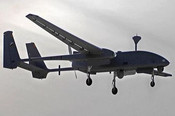
Five Israeli military aircraft have entered Lebanese airspace and flown over areas of the country in blatant violation of a UN Security Council resolution.
An Israeli reconnaissance plane crossed into Lebanese airspace over the southern border town of Alma al-Shaab at 10:45 a.m. local time (0745 GMT) on Friday, according to a statement issued by the Lebanese military.
The remote-controlled aircraft made surveillance flights over several areas in southern Lebanon and Beirut before it left Lebanese airspace at 2 p.m. local time (1100 GMT) while flying over the border village of Kfar Kila, located 96 kilometers (59 miles) south of Beirut.
Earlier in the day, two Israeli fighter jets violated Lebanese airspace over the southern village of Kfar Kila at 10:35 a.m. local time (0735 GMT). The warplanes left at 12:25 p.m. (0925 GMT) local time, flying over the southern border of Lebanon.
An Israeli drone breached Lebanon's airspace over the village town of Kfar Kila at 10:05 a.m. (0705 GMT) on Friday. The aircraft flew over the southern border of Lebanon and left the country’s airspace 10 minutes later.
On Thursday, an Israeli surveillance drone violated Lebanese airspace over the southern village of al-Naqoura, which is situated 91 kilometers (57 miles) south of Beirut, at 10:05 p.m. local time (1905 GMT) and flew over several areas of Lebanon.
The Israeli aircraft left Lebanese airspace at around 6 a.m. local time (0300 GMT) on Friday.
Israel violates Lebanon's airspace on an almost daily basis, claiming the flights serve surveillance purposes.
Lebanon's government, the Hezbollah resistance movement, and the UN Interim Force in Lebanon, known as UNIFIL, have repeatedly condemned the overflights, saying they are in clear violation of UN Resolution 1701 and the country's sovereignty.
UN Security Council Resolution 1701, which brokered a ceasefire in the war of aggression Israel launched against Lebanon in 2006, calls on Israel to respect Lebanon's sovereignty and territorial integrity.
In 2009, Lebanon filed a complaint with the United Nations, presenting over 7,000 documents pertaining to Israeli violations of Lebanese territory.
An Israeli reconnaissance plane crossed into Lebanese airspace over the southern border town of Alma al-Shaab at 10:45 a.m. local time (0745 GMT) on Friday, according to a statement issued by the Lebanese military.
The remote-controlled aircraft made surveillance flights over several areas in southern Lebanon and Beirut before it left Lebanese airspace at 2 p.m. local time (1100 GMT) while flying over the border village of Kfar Kila, located 96 kilometers (59 miles) south of Beirut.
Earlier in the day, two Israeli fighter jets violated Lebanese airspace over the southern village of Kfar Kila at 10:35 a.m. local time (0735 GMT). The warplanes left at 12:25 p.m. (0925 GMT) local time, flying over the southern border of Lebanon.
An Israeli drone breached Lebanon's airspace over the village town of Kfar Kila at 10:05 a.m. (0705 GMT) on Friday. The aircraft flew over the southern border of Lebanon and left the country’s airspace 10 minutes later.
On Thursday, an Israeli surveillance drone violated Lebanese airspace over the southern village of al-Naqoura, which is situated 91 kilometers (57 miles) south of Beirut, at 10:05 p.m. local time (1905 GMT) and flew over several areas of Lebanon.
The Israeli aircraft left Lebanese airspace at around 6 a.m. local time (0300 GMT) on Friday.
Israel violates Lebanon's airspace on an almost daily basis, claiming the flights serve surveillance purposes.
Lebanon's government, the Hezbollah resistance movement, and the UN Interim Force in Lebanon, known as UNIFIL, have repeatedly condemned the overflights, saying they are in clear violation of UN Resolution 1701 and the country's sovereignty.
UN Security Council Resolution 1701, which brokered a ceasefire in the war of aggression Israel launched against Lebanon in 2006, calls on Israel to respect Lebanon's sovereignty and territorial integrity.
In 2009, Lebanon filed a complaint with the United Nations, presenting over 7,000 documents pertaining to Israeli violations of Lebanese territory.
28 aug 2012
7 Israeli aircraft violate Lebanon’s airspace
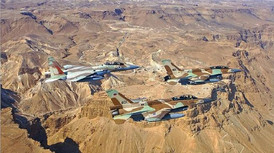
Three Israeli warplanes -- two F-16s and one F-15 -- fly in formation
Seven Israeli military aircraft have entered Lebanese airspace and flown over areas of the country in blatant violation of a UN Security Council resolution.
An Israeli reconnaissance plane crossed into Lebanese airspace over the southern border town of Alma al-Shaab at 7 a.m. local time (0400 GMT) on Tuesday, according to a statement issued by the Lebanese military.
The remote-controlled aircraft made surveillance flights over several areas in southern Lebanon and Beirut before it left Lebanese airspace at 2:15 p.m. local time (1115 GMT) while flying over the village of al-Naqoura, which is situated 91 kilometers (57 miles) south of Beirut.
On Monday, two Israeli fighter jets violated Lebanese airspace over the southern village of Rmeish at 5 p.m. local time (1400 GMT). The warplanes left 15 minutes later, flying over the southern border of Lebanon.
Earlier in the day, an Israeli unmanned aerial vehicle violated Lebanese airspace over the southern village of al-Naqoura at 12:10 p.m. (0910 GMT) and flew over the towns of Baalbek, al-Harmel, and al-Arz. The aircraft flew over the southern border of Lebanon at 6:50 p.m. local time (1550 GMT) and left the country’s airspace.
An Israeli drone breached Lebanon's airspace over the border town of Alma al-Shaab at 11:45 a.m. local time (0845 GMT) on Monday and flew over southern areas of the country. It left Lebanese airspace at 4:20 p.m. local time (1320 GMT).
And two Israeli warplanes crossed into Lebanese airspace on Monday over the border village of Kfar Kila, located 96 kilometers (59 miles) south of Beirut, at 11:05 a.m. local time (0815 GMT) and flew over several areas of Lebanon.
The Israeli aircraft left Lebanese airspace at around 12:50 p.m. local time (0950 GMT) while flying over the southern village of Rmeish.
Israel violates Lebanon's airspace on an almost daily basis, claiming the flights serve surveillance purposes.
Lebanon's government, the Hezbollah resistance movement, and the UN Interim Force in Lebanon, known as UNIFIL, have repeatedly condemned the overflights, saying they are in clear violation of UN Resolution 1701 and the country's sovereignty.
UN Security Council Resolution 1701, which brokered a ceasefire in the war of aggression Israel launched against Lebanon in 2006, calls on Israel to respect Lebanon's sovereignty and territorial integrity.
In 2009, Lebanon filed a complaint with the United Nations, presenting over 7,000 documents pertaining to Israeli violations of Lebanese territory.
Seven Israeli military aircraft have entered Lebanese airspace and flown over areas of the country in blatant violation of a UN Security Council resolution.
An Israeli reconnaissance plane crossed into Lebanese airspace over the southern border town of Alma al-Shaab at 7 a.m. local time (0400 GMT) on Tuesday, according to a statement issued by the Lebanese military.
The remote-controlled aircraft made surveillance flights over several areas in southern Lebanon and Beirut before it left Lebanese airspace at 2:15 p.m. local time (1115 GMT) while flying over the village of al-Naqoura, which is situated 91 kilometers (57 miles) south of Beirut.
On Monday, two Israeli fighter jets violated Lebanese airspace over the southern village of Rmeish at 5 p.m. local time (1400 GMT). The warplanes left 15 minutes later, flying over the southern border of Lebanon.
Earlier in the day, an Israeli unmanned aerial vehicle violated Lebanese airspace over the southern village of al-Naqoura at 12:10 p.m. (0910 GMT) and flew over the towns of Baalbek, al-Harmel, and al-Arz. The aircraft flew over the southern border of Lebanon at 6:50 p.m. local time (1550 GMT) and left the country’s airspace.
An Israeli drone breached Lebanon's airspace over the border town of Alma al-Shaab at 11:45 a.m. local time (0845 GMT) on Monday and flew over southern areas of the country. It left Lebanese airspace at 4:20 p.m. local time (1320 GMT).
And two Israeli warplanes crossed into Lebanese airspace on Monday over the border village of Kfar Kila, located 96 kilometers (59 miles) south of Beirut, at 11:05 a.m. local time (0815 GMT) and flew over several areas of Lebanon.
The Israeli aircraft left Lebanese airspace at around 12:50 p.m. local time (0950 GMT) while flying over the southern village of Rmeish.
Israel violates Lebanon's airspace on an almost daily basis, claiming the flights serve surveillance purposes.
Lebanon's government, the Hezbollah resistance movement, and the UN Interim Force in Lebanon, known as UNIFIL, have repeatedly condemned the overflights, saying they are in clear violation of UN Resolution 1701 and the country's sovereignty.
UN Security Council Resolution 1701, which brokered a ceasefire in the war of aggression Israel launched against Lebanon in 2006, calls on Israel to respect Lebanon's sovereignty and territorial integrity.
In 2009, Lebanon filed a complaint with the United Nations, presenting over 7,000 documents pertaining to Israeli violations of Lebanese territory.
25 aug 2012
Israeli spy drone violates Lebanese airspace
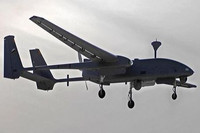
An Israeli reconnaissance plane has violated Lebanese airspace and flown over parts of the country in flagrant violation of United Nations Security Council Resolution 1701.
The unmanned aerial vehicle crossed into Lebanon's airspace over the border village of Kfar Kila, located 96 kilometers (59 miles) south of Beirut, at 6:30 a.m. local time (0330 GMT) on Saturday, according to a statement issued by the Lebanese military.
The remote-controlled aircraft made surveillance flights over the towns of Riyaq, Baalbek, and al-Harmel and several other areas of Lebanon before it left Lebanese airspace at 2:10 p.m. local time (1110 GMT) while flying over the southern village of Rmeish.
Israel violates Lebanon's airspace on an almost daily basis, claiming the flights serve surveillance purposes.
Lebanon's government, the Hezbollah resistance movement, and the UN Interim Force in Lebanon, known as UNIFIL, have repeatedly condemned the overflights, saying they are in clear violation of UN Resolution 1701 and the country's sovereignty.
UN Security Council Resolution 1701, which brokered a ceasefire in the war of aggression Israel launched against Lebanon in 2006, calls on Israel to respect Lebanon's sovereignty and territorial integrity.
In 2009, Lebanon filed a complaint with the United Nations, presenting over 7,000 documents pertaining to Israeli violations of Lebanese territory.
The unmanned aerial vehicle crossed into Lebanon's airspace over the border village of Kfar Kila, located 96 kilometers (59 miles) south of Beirut, at 6:30 a.m. local time (0330 GMT) on Saturday, according to a statement issued by the Lebanese military.
The remote-controlled aircraft made surveillance flights over the towns of Riyaq, Baalbek, and al-Harmel and several other areas of Lebanon before it left Lebanese airspace at 2:10 p.m. local time (1110 GMT) while flying over the southern village of Rmeish.
Israel violates Lebanon's airspace on an almost daily basis, claiming the flights serve surveillance purposes.
Lebanon's government, the Hezbollah resistance movement, and the UN Interim Force in Lebanon, known as UNIFIL, have repeatedly condemned the overflights, saying they are in clear violation of UN Resolution 1701 and the country's sovereignty.
UN Security Council Resolution 1701, which brokered a ceasefire in the war of aggression Israel launched against Lebanon in 2006, calls on Israel to respect Lebanon's sovereignty and territorial integrity.
In 2009, Lebanon filed a complaint with the United Nations, presenting over 7,000 documents pertaining to Israeli violations of Lebanese territory.
21 aug 2012
US seizes $150 million from Lebanese bank in laundering scheme
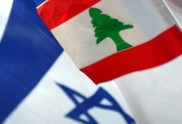
By Basil Katz
NEW YORK (Reuters) -- US authorities said on Monday that they had seized $150 million from a Lebanese bank suspected of being at the heart of international money-laundering schemes linked to the Lebanese Shiite group Hezbollah.
In February 2011, the US Treasury department designated the Lebanese Canadian Bank as a "primary money-laundering concern." The privately owned bank was subsequently merged with the Lebanese subsidiary of Societe Generale.
Federal prosecutors in Manhattan and the US Drug Enforcement Administration accused bank officials of knowingly participating in a scheme in which money from various individuals and companies in Beirut was sent from Lebanon to purchase used cars in the United States. The cars were then sold in West Africa, and Hezbollah-linked groups would help smuggle the proceeds into Lebanon, authorities said.
Hezbollah was founded with Iran's help after the Israeli invasion of Lebanon in 1982.
Washington considers Hezbollah to be a terrorist group. US officials say that it has become increasingly involved in the drug trade, facilitating the distribution and sale of cocaine in West Africa.
The money seized was held in corresponding accounts at five different banks in the United States, including Citibank and London-based bank Standard Chartered. The five banks have not been accused of any wrongdoing.
An attorney for the Lebanese Canadian Bank did not immediately return a call seeking comment.
NEW YORK (Reuters) -- US authorities said on Monday that they had seized $150 million from a Lebanese bank suspected of being at the heart of international money-laundering schemes linked to the Lebanese Shiite group Hezbollah.
In February 2011, the US Treasury department designated the Lebanese Canadian Bank as a "primary money-laundering concern." The privately owned bank was subsequently merged with the Lebanese subsidiary of Societe Generale.
Federal prosecutors in Manhattan and the US Drug Enforcement Administration accused bank officials of knowingly participating in a scheme in which money from various individuals and companies in Beirut was sent from Lebanon to purchase used cars in the United States. The cars were then sold in West Africa, and Hezbollah-linked groups would help smuggle the proceeds into Lebanon, authorities said.
Hezbollah was founded with Iran's help after the Israeli invasion of Lebanon in 1982.
Washington considers Hezbollah to be a terrorist group. US officials say that it has become increasingly involved in the drug trade, facilitating the distribution and sale of cocaine in West Africa.
The money seized was held in corresponding accounts at five different banks in the United States, including Citibank and London-based bank Standard Chartered. The five banks have not been accused of any wrongdoing.
An attorney for the Lebanese Canadian Bank did not immediately return a call seeking comment.
17 aug 2012
Hezbollah - Who created it, why it was created, how it was created?
Hezbollah - Who created it, why it was created, how it was created?
|
|
Hezbollah will give crushing response if Tel Aviv attacks Lebanon: Nasrallah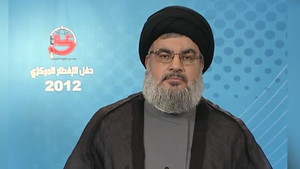
Hezbollah Secretary-General Seyyed Hassan Nasrallah has warned that the anti-Israel resistance movement will turn the lives of hundreds of thousands of Israelis into a living hell if Tel Aviv attacks Lebanon again. Addressing Hezbollah supporters on the occasion of the International Al-Quds Day, Nasrallah said on Friday that Hezbollah has both the capability and the courage to defend
|
Lebanon and that the movement's missiles are ready to strike back certain targets inside Israel in self-defense if Tel Aviv launches an attack on Lebanon.
"If we are forced to use them to protect our people and our country, we will not hesitate to do so... and that will turn the lives of hundreds of thousands of Zionists into a living hell," Nasrallah said, adding that Hezbollah has fixed its targets.
He also said that a possible future war would be extremely costly for Israel and incomparable with its 2006 war against Lebanon.
Hezbollah leader said Israel's humiliating defeat in the 33-day war in 2006 is the main reason behind Israeli military officials' opposition to the government plans for launching war against another country, namely Iran.
He also criticized certain Arab states for fueling the unrest in Syria by supporting and funding anti-Damascus insurgents, saying that they are serving Israeli interests by doing that since Tel Aviv wants the anti-Israel resistance axis to lose Syria.
Nasrallah described some Arab leaders as "leaders of sedition" over their tough approach toward Syria unrest.
He urged Saudi Arabia to stop funding media outlets that promote division among Muslims.
The Hezbollah leader also condemned the Organization of Islamic Cooperation's (OIC) decision to suspend Syria’s membership, saying that the move means a green light to more killings and bloodshed in the country.
Nasrallah also urged Muslims around the world to adopt a unified stance on Israeli-Palestinian conflict and al-Quds issue.
"If we are forced to use them to protect our people and our country, we will not hesitate to do so... and that will turn the lives of hundreds of thousands of Zionists into a living hell," Nasrallah said, adding that Hezbollah has fixed its targets.
He also said that a possible future war would be extremely costly for Israel and incomparable with its 2006 war against Lebanon.
Hezbollah leader said Israel's humiliating defeat in the 33-day war in 2006 is the main reason behind Israeli military officials' opposition to the government plans for launching war against another country, namely Iran.
He also criticized certain Arab states for fueling the unrest in Syria by supporting and funding anti-Damascus insurgents, saying that they are serving Israeli interests by doing that since Tel Aviv wants the anti-Israel resistance axis to lose Syria.
Nasrallah described some Arab leaders as "leaders of sedition" over their tough approach toward Syria unrest.
He urged Saudi Arabia to stop funding media outlets that promote division among Muslims.
The Hezbollah leader also condemned the Organization of Islamic Cooperation's (OIC) decision to suspend Syria’s membership, saying that the move means a green light to more killings and bloodshed in the country.
Nasrallah also urged Muslims around the world to adopt a unified stance on Israeli-Palestinian conflict and al-Quds issue.
14 aug 2012
4 Israeli warplanes violate Lebanese airspace
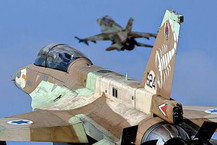
Four Israeli warplanes have violated Lebanon's airspace and flown over the country in flagrant violation of United Nations Security Council Resolution 1701, Press TV reports.
According to a statement issued by the Lebanese army on August 14, the Israeli aircraft entered Lebanese airspace above the southern town of Alma el Shaab at 10:30 a.m. local time on Tuesday, a Press TV correspondent in Beirut reported.
The statement said that the Israeli planes then flew over several Lebanese territories before leaving the country’s airspace above the village of Rmeish at 11:40 a.m. local time on the same day.
Israel violates Lebanon's airspace on an almost daily basis, claiming the flights serve surveillance purposes.
Lebanon's government, the Hezbollah resistance movement, and the UN Interim Force in Lebanon, known as UNIFIL, have repeatedly condemned the overflights, saying they are in clear violation of UN Resolution 1701 and the country's sovereignty.
UN Security Council Resolution 1701, which brokered a ceasefire in the war of aggression Israel launched against Lebanon in 2006, calls on Israel to respect Lebanon's sovereignty and territorial integrity.
In 2009, Lebanon filed a complaint with the United Nations, presenting over 7,000 documents pertaining to Israeli violations of Lebanese territory.
According to a statement issued by the Lebanese army on August 14, the Israeli aircraft entered Lebanese airspace above the southern town of Alma el Shaab at 10:30 a.m. local time on Tuesday, a Press TV correspondent in Beirut reported.
The statement said that the Israeli planes then flew over several Lebanese territories before leaving the country’s airspace above the village of Rmeish at 11:40 a.m. local time on the same day.
Israel violates Lebanon's airspace on an almost daily basis, claiming the flights serve surveillance purposes.
Lebanon's government, the Hezbollah resistance movement, and the UN Interim Force in Lebanon, known as UNIFIL, have repeatedly condemned the overflights, saying they are in clear violation of UN Resolution 1701 and the country's sovereignty.
UN Security Council Resolution 1701, which brokered a ceasefire in the war of aggression Israel launched against Lebanon in 2006, calls on Israel to respect Lebanon's sovereignty and territorial integrity.
In 2009, Lebanon filed a complaint with the United Nations, presenting over 7,000 documents pertaining to Israeli violations of Lebanese territory.
|
|
Honoring Israel’s defeat in the Israel-Lebanon War, known as the 33-Day War.
A week before international day of Al-Quds, marking the last Friday of the holy month of Ramadan to express solidarity with the Palestinian people and opposing Israel’s control of Jerusalem Al-Quds, a museum has opened to honor the anniversary of the Israel-Lebanon War. The war between the Israeli military and the Lebanese movement of Hezbollah started on July 12, 2006 and lasted 33-days. The war formally ended when Israel lifted its naval blockade of Lebanon. Isreal’s invasion resulted in the deaths of over 1,200 Lebanese civilians and around 150 Israelis. In addition Israel killed over 150 Hezbollah fighters and over forty Lebanese security-force personnel while over 110 Israeli officers were killed. According to the editor-in-chief of Al-Wifaq Newspaper, the US was behind Israel’s invasion: |
According to the UN, Israel destroyed around 15,000 homes, 900 businesses, 77 bridges, and 31 utility plants in Lebanon, while Israel’s level of physical destruction was far lower.
10 aug 2012
New US-Israeli computer virus targets Lebanese banks
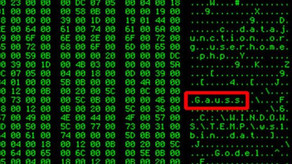
Experts say the new US-Israeli virus, Gauss, which has been detected in many computers in Lebanese banks, is written by the same programmers who created Flame.
A Russian computer security firm has discovered a new “state-sponsored computer virus,” co-developed by Tel Aviv and Washington, which targets the computers of specific major banks in Lebanon.
According to a Thursday New York Times article, the Kapersky Lab said the virus appeared to have been written by the same programmers who created Flame, a data-mining computer virus, and it might be linked to the Stuxnet virus, the virus that was intended to disrupt Iran’s nuclear energy program in 2010.
The same paper confirmed in a June article that Stuxnet was jointly developed by the United States and Israeli government.
Iranian authorities have always maintained that the Stuxnet virus was detected in time by Iranian IT and nuclear experts and had no effect on the country’s nuclear energy program.
The latest virus, nicknamed Gauss, has reportedly been detected in hundreds of computers in Lebanon with an apparent aim of acquiring “logins for e-mail and instant messaging accounts, social networks and, notably, accounts at certain banks.”
The report further revealed that targeted banks included several major Lebanese banks such as the Bank of Beirut, BLOM Bank, Byblos Bank and Credit Libanais, as well as Citibank.
“We have never seen any malware target such a specific range of banks,” said Costin Raiu, Kaspersky’s director of global research and analysis.
“There is absolutely no doubt that Gauss and Flame were printed by the same factories,” added Raiu.
“An early version of Stuxnet used a module from Flame, which shows they are connected. Stuxnet was created by a nation-state - it simply could not have been designed without nation-state support - which means Flame and Gauss were created with nation-state support as well.”
The report further quotes Kaspersky researchers as saying that the Gauss virus contained a “warhead” that “seeks a very specific computer system with no Internet connection and installs itself only if it finds one.”
A Russian computer security firm has discovered a new “state-sponsored computer virus,” co-developed by Tel Aviv and Washington, which targets the computers of specific major banks in Lebanon.
According to a Thursday New York Times article, the Kapersky Lab said the virus appeared to have been written by the same programmers who created Flame, a data-mining computer virus, and it might be linked to the Stuxnet virus, the virus that was intended to disrupt Iran’s nuclear energy program in 2010.
The same paper confirmed in a June article that Stuxnet was jointly developed by the United States and Israeli government.
Iranian authorities have always maintained that the Stuxnet virus was detected in time by Iranian IT and nuclear experts and had no effect on the country’s nuclear energy program.
The latest virus, nicknamed Gauss, has reportedly been detected in hundreds of computers in Lebanon with an apparent aim of acquiring “logins for e-mail and instant messaging accounts, social networks and, notably, accounts at certain banks.”
The report further revealed that targeted banks included several major Lebanese banks such as the Bank of Beirut, BLOM Bank, Byblos Bank and Credit Libanais, as well as Citibank.
“We have never seen any malware target such a specific range of banks,” said Costin Raiu, Kaspersky’s director of global research and analysis.
“There is absolutely no doubt that Gauss and Flame were printed by the same factories,” added Raiu.
“An early version of Stuxnet used a module from Flame, which shows they are connected. Stuxnet was created by a nation-state - it simply could not have been designed without nation-state support - which means Flame and Gauss were created with nation-state support as well.”
The report further quotes Kaspersky researchers as saying that the Gauss virus contained a “warhead” that “seeks a very specific computer system with no Internet connection and installs itself only if it finds one.”
8 aug 2012
Resistance axis more potent against enemy: Nasrallah
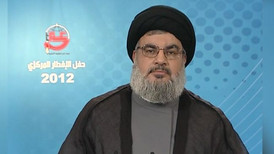
Hezbollah's Secretary General Seyyed Hassan Nasrallah says the resistance front in the region will counter the US and Israeli plots more forcefully as it has successfully weathered their previous schemes.
“At the current juncture when nations have awakened and taken a stand against the American and Zionist (Israeli) plots, the resistance axis will, with popular support, react more forcefully in confronting the enemy,” said Nasrallah in a Tuesday meeting with visiting General Secretary of Iran’s Supreme Council of National Security Saeed Jalili in Beirut.
Reiterating that Hezbollah has all along been aware of the “American and Zionist conspiracies” against the resistance front, the Hezbollah secretary general added, “We have already experienced such crises and been able to overcome them with resistance and endurance.”
Nasrallah further voiced gratitude for the unwavering support and position of Leader of the Islamic Revolution Ayatollah Seyyed Ali Khamenei as well as the Iranian nation and government “against Western and Zionist schemes” and emphasized the significance of the role the Islamic Republic can play during the current sensitive circumstance in the region.
Jalili in turn described Iran’s support for “the oppressed nations in the region against ploys by the global hegemony and international Zionism” as an underlying principle of the Islamic Revolution in Iran and said, “Just as we have supported the oppressed Palestinian people despite all difficulties regarding the Palestine issue, we will extend our support to regional nations amid the Islamic Awakening trend and the revolution against the global hegemony.”
The senior Iranian national security official also described the Palestinian and Lebanese resistance against Israeli aggressions as “an honor for the Arab world,” adding that the ongoing Islamic Awakening movements are among the accomplishments of such resistance.
Referring to the situation in Syria, Jalili said, “The Syrian nation and authorities are the ones that must make the decision for the fate and future of their country and democracy is the only solution to the Syrian troubles.”
During their meeting Jalili and Nasrallah reviewed the recent regional developments, particularly the renewed Western plots against the resistance front, specifically targeting Lebanon and Syria.
“At the current juncture when nations have awakened and taken a stand against the American and Zionist (Israeli) plots, the resistance axis will, with popular support, react more forcefully in confronting the enemy,” said Nasrallah in a Tuesday meeting with visiting General Secretary of Iran’s Supreme Council of National Security Saeed Jalili in Beirut.
Reiterating that Hezbollah has all along been aware of the “American and Zionist conspiracies” against the resistance front, the Hezbollah secretary general added, “We have already experienced such crises and been able to overcome them with resistance and endurance.”
Nasrallah further voiced gratitude for the unwavering support and position of Leader of the Islamic Revolution Ayatollah Seyyed Ali Khamenei as well as the Iranian nation and government “against Western and Zionist schemes” and emphasized the significance of the role the Islamic Republic can play during the current sensitive circumstance in the region.
Jalili in turn described Iran’s support for “the oppressed nations in the region against ploys by the global hegemony and international Zionism” as an underlying principle of the Islamic Revolution in Iran and said, “Just as we have supported the oppressed Palestinian people despite all difficulties regarding the Palestine issue, we will extend our support to regional nations amid the Islamic Awakening trend and the revolution against the global hegemony.”
The senior Iranian national security official also described the Palestinian and Lebanese resistance against Israeli aggressions as “an honor for the Arab world,” adding that the ongoing Islamic Awakening movements are among the accomplishments of such resistance.
Referring to the situation in Syria, Jalili said, “The Syrian nation and authorities are the ones that must make the decision for the fate and future of their country and democracy is the only solution to the Syrian troubles.”
During their meeting Jalili and Nasrallah reviewed the recent regional developments, particularly the renewed Western plots against the resistance front, specifically targeting Lebanon and Syria.
27 july 2012
Israel violates Lebanese airspace
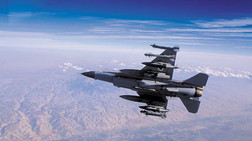
An Israeli reconnaissance plane has violated Lebanon's airspace and flown over the country in flagrant violation of United Nations Security Council Resolution 1701, Press TV reports.
According to a statement issued by the Lebanese army on July 27, the Israeli aircraft entered Lebanese airspace above the southern town of al-Naqoura at 11:45 p.m. local time on Thursday, a Press TV correspondent in Beirut reported.
The statement said that the Israeli plane then flew over southern Lebanon and Beirut before leaving the country’s airspace above al-Naqoura at 7:10 a.m. local time on Friday.
Israel violates Lebanon's airspace on an almost daily basis, claiming the flights serve surveillance purposes.
Lebanon's government, the Hezbollah resistance movement, and the UN Interim Force in Lebanon, known as UNIFIL, have repeatedly condemned the overflights, saying they are in clear violation of UN Resolution 1701 and the country's sovereignty.
UN Security Council Resolution 1701, which brokered a ceasefire in the war of aggression Israel launched against Lebanon in 2006, calls on Israel to respect Lebanon's sovereignty and territorial integrity.
In 2009, Lebanon filed a complaint with the United Nations, presenting over 7,000 documents pertaining to Israeli violations of Lebanese territory.
According to a statement issued by the Lebanese army on July 27, the Israeli aircraft entered Lebanese airspace above the southern town of al-Naqoura at 11:45 p.m. local time on Thursday, a Press TV correspondent in Beirut reported.
The statement said that the Israeli plane then flew over southern Lebanon and Beirut before leaving the country’s airspace above al-Naqoura at 7:10 a.m. local time on Friday.
Israel violates Lebanon's airspace on an almost daily basis, claiming the flights serve surveillance purposes.
Lebanon's government, the Hezbollah resistance movement, and the UN Interim Force in Lebanon, known as UNIFIL, have repeatedly condemned the overflights, saying they are in clear violation of UN Resolution 1701 and the country's sovereignty.
UN Security Council Resolution 1701, which brokered a ceasefire in the war of aggression Israel launched against Lebanon in 2006, calls on Israel to respect Lebanon's sovereignty and territorial integrity.
In 2009, Lebanon filed a complaint with the United Nations, presenting over 7,000 documents pertaining to Israeli violations of Lebanese territory.
